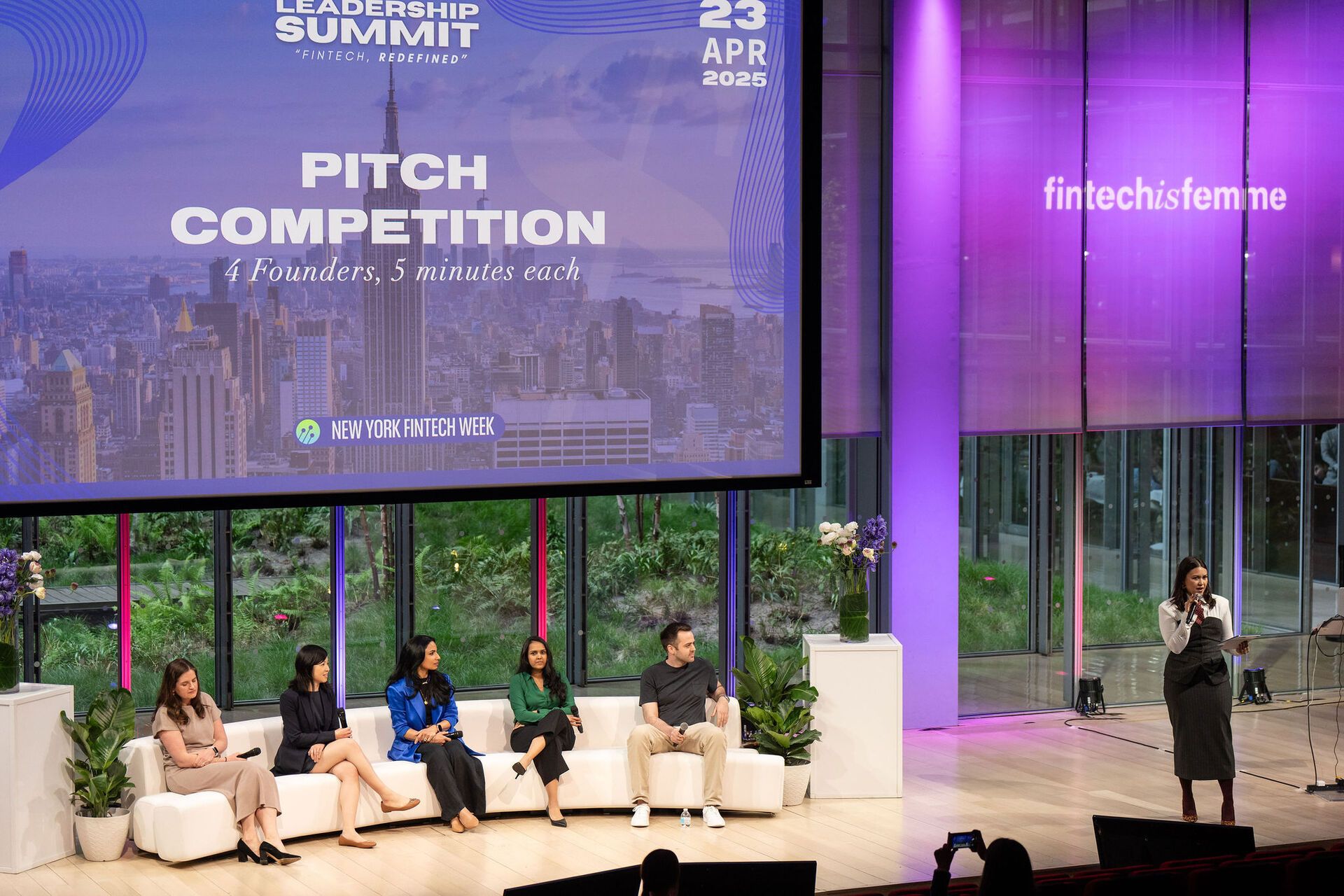- Fintech Is Femme
- Posts
- 🤑 Then vs. Now
🤑 Then vs. Now
Why Backing Female Founders Is Fintech’s Smartest Growth Strategy (and the Data Proves It)

Hi fintech fam 💜
Summer is doing what summer does — flying by — and I’m starting to seriously miss seeing this community in real life. So, I’m fixing that.
First things first: we’re officially building the Fintech Is Femme Leadership Summit: SF Tech Week Edition. It’s happening October 8 during SF Tech Week, and it’s going to be our biggest West Coast gathering yet.
I’m already in talks with content sponsors to shape a killer agenda, and there are so many ways for you to get involved — from sponsoring to speaking to simply showing up and being part of the magic. (Our official website is still cookin’, but you can get an early peek at the details here).
And even sooner: On August 12, I’m hosting an NYC summer happy hour to reconnect, celebrate what’s ahead, and start shaping the vision for our biggest event yet: the Fintech Is Femme Leadership & Security Summit 2026. Apply to join us — it’s going to be one of those nights that sets the tone for everything to come.
Now, let’s get into today’s column.
INNOVATION
Why Backing Female Founders Is Fintech’s Smartest Growth Strategy (and the Data Proves It)

Fintech Is Femme Leadership Summit Pitch Competition. April 23, 2025. New York City.
If you’ve been paying attention to venture funding over the last decade, the headline about female founders hasn’t changed much: 2% of venture dollars.
That’s the stubborn, flatline figure the Female Founders Fund (FFF) highlights in their new 10‑year review of female founder funding.
But here’s the thing they also surfaced — and it’s the part we don’t talk about enough:
Female founders are winning anyway.
According to FFF, female‑led startups now represent 24% of U.S. venture exits — nearly double their share from 2014.
They’re delivering 2.5x more revenue per dollar raised than male‑led teams.
They burn 15% less capital while growing.
And they’re getting to unicorn status faster than the market average.
If you’re a founder reading this, you know those aren’t “soft wins.”
Those are the metrics VCs obsess over: capital efficiency, growth velocity, exit value. The math is screaming at us: backing women pays off.
So why hasn’t the capital followed?
Because the system wasn’t designed for them.
FFF’s report lays it out:
Pattern bias: Investors double down on what they know — which often looks like the last founder they funded (read: white, male, Stanford‑adjacent).
Network gatekeeping: Nearly 70% of VC deals come from warm intros. If you’re not in the room (or the group chat), good luck.
Risk aversion in downturns: When the market tightens, VCs “play it safe.” Which, translated, often means writing fewer checks to anyone who doesn’t fit their pre‑existing mold.
And in fintech, these structural barriers are even higher.
Fintech remains one of the most network‑driven corners of venture. Deals get done over text threads, quiet intros, and investor‑founder overlap at events.
Legacy banking DNA is still thick in the industry’s veins, and while that’s slowly shifting, there’s no question: fintech can still feel like a closed club.
And yet, female founders are breaking through — and in some of the most critical areas of innovation.
Why Fintech Needs Women Founders — And Why the Economy Can’t Afford to Ignore Them

Nowhere is the case for backing women founders more urgent than in fintech.
Finance touches every part of our lives — from how we bank, borrow, and invest to how we access opportunities for mobility and security.
Yet the products shaping this future are still largely designed by homogeneous teams, for homogeneous users.
Female fintech founders like Shivani Siroya of Tala — whose platform now serves 10 million customers across three continents, originating $6B in credit with a 92% repayment rate — prove what happens when inclusion drives innovation. In Q1 2025, Tala hit a $300M annualized revenue run rate with a three‑year CAGR of 35%.
Startups like Anam Lakani and Eve Halimi of Alinea Invest, who recently closed their Series A to scale their next-gen investing platform, are redefining what wealth-building looks like for a new generation of women.
These founders aren’t just building companies; they’re building bridges into the financial system for communities historically excluded from it.
Ignoring them isn’t just inequitable — it’s economically shortsighted.
In a sector poised to reshape global capital flows, backing women founders isn’t a social good. It’s a competitive advantage.
Plus, there’s the wave of female founders leading regtech and fraud‑prevention startups, tackling the complex identity and compliance issues that will define the next decade of finance.
These women aren’t just “in the room.” They’re redefining the room.
That’s why at Fintech Is Femme, we build the platform, the stage, and the room — creating new systems and networks that actually deliver resources, connections, and value where they’re needed most.
Why We Need Them to Thrive
The funding gap isn’t just a moral failing — it’s a market inefficiency.
FFF points out that despite controlling just 2% of the venture pie, female‑founded teams accounted for nearly a quarter of exits in 2024. That’s an insane mismatch between capital allocated and value created. Imagine what happens when these founders get real access — not scraps, but true conviction‑stage backing.
If you care about building the next generation of durable fintech infrastructure, you should care about who gets funded.
Because the founders who survive on 2%? They’ve had to build with resilience baked into their DNA. They’ve scaled with less, they’ve engineered leaner, smarter teams, and they’ve designed products for underserved markets the old guard overlooked.
That is fintech at its core: rewriting the rules of access, trust, and usability.
What This Means for Investors
There’s a wake‑up call here for fintech investors: stop treating gender equity like philanthropy.
Backing women isn’t “doing good.” It’s doing smart business. It’s betting on founders who’ve proven they can generate outsized returns with undersized checks.
The good news? The gatekeepers are slowly changing. The report notes that women now hold 17% of decision‑making roles at VC firms — up from just 6% a decade ago — and nearly half of angel investors are women. This isn’t parity, but it’s momentum.
If you’re writing checks in 2025, you have an opportunity to close the gap while grabbing alpha that others are sleeping on.
What This Means for Founders
For the women building fintech companies right now, this report is fuel — and a reality check.
Yes, you are operating in an environment that remains deeply biased and network‑driven. But you’re also in a sector where the stakes are so high and the opportunities so massive that no one can afford to ignore performance.
The data is your receipts. Use them.
Push investors on their own logic: If efficiency, revenue per dollar, and exit velocity are the metrics they claim to prize, then fund allocation needs to follow.
So, What’s Next?
The Female Founders Fund sums it up well: the pipeline isn’t the problem. Access is.
And here’s the real takeaway for fintech: If we want a more innovative, resilient, and inclusive financial system, we need more women at the cap table — as founders and as funders.
This isn’t about “helping female founders.” It’s about building the kind of companies that can thrive in the next decade of fintech — AI‑driven, regulation‑ready, risk‑aware, and relentlessly customer‑focused.
To the founders: keep building. To the investors: recalibrate your pattern recognition. The market inefficiency won’t correct itself.
If the next decade belongs to those bold enough to see the opportunity and invest in it, then here’s your move: bet on women.
Top 5 Takeaways for Fintech Operators & Investors
Invest in efficiency: Female founders deliver 2.5x more revenue per dollar and burn 15% less capital — numbers fintech VCs claim to love.
Look beyond the network: 70% of deals still come from warm intros. Expand your sourcing to catch the talent outside your group chat.
Bet early, bet bold: The Series A bottleneck is real. Female founders need conviction‑stage checks sooner, not later.
Fund for impact and returns: Female‑led startups aren’t “diversity plays” — they’re outperforming, faster‑scaling category leaders.
Shift who writes the checks: More women in VC (now 17%) is good, but LPs need to double down on backing diverse managers to truly change what gets built.
Check out the full report here.
WTF ELSE?
JPMorgan: Fintech middlemen like Plaid are 'massively taxing' its systems
PayPal to let U.S. merchants accept payment in more than 100 cryptocurrencies
The GENIUS Act is here — let’s not let history repeat itself
I WANT IT, I GOT IT
🎧 Today’s Listen: Last week on Fintech Mavericks: I sat down with Laura Bock, Partner at QED Investors, one of the most active and forward-thinking VC firms in fintech today. She shared what early signals she trusts, how to balance founder vision with investor logic, and why some of fintech’s biggest opportunities are hiding in plain sight. Tune in here or wherever you get your podcasts.
🚀 Today’s Announcement: I’m so excited to share that I’m officially an expert on Hubble! After years of building a media company and mastering the art of storytelling, I’m finally opening up 1:1 calls to share everything I’ve learned — no gatekeeping, just real talk. Want to build a newsletter that sticks? Grow a community? Launch a podcast? Pull off events that actually convert? Let’s make it happen. Book a 15–30 minute session with me here — can’t wait to connect.
🧘♀️Today’s Self-Care: Community. Nothing beats being in the same room together. And it’s been too long. So — we’re fixing that. I’m hosting a summer soirée to kick off planning for the next Fintech Is Femme Leadership & Security Summit at NY Fintech Week 2026 — co‑hosted (of course!) with Frances Zelazny of Anonybit. This is your chance to help shape the agenda, build partnerships, and reconnect with the fintech leaders driving the conversation. August 12. Summer vibes, big ideas, and the start of something huge. Apply to attend here — let’s build what’s next together.
#SPONSORED
This Startup Is Making Plastic Obsolete
Timeplast created a plastic that dissolves in water, leaving no waste. Their tech could revolutionize the $1.3T plastic industry. That’s why 7,000+ people have already invested, and you have only a few days left to join them. Invest in Timeplast by July 31 at midnight.
This is a paid advertisement for Timeplast’s Regulation CF Offering. Please read the offering circular at invest.timeplast.com.
FINTUNES
It’s the era of throwbacks and nostalgia — and of course this song is making its comeback thanks to the Freakier Friday sequel. As a millennial, it’s hitting all my heartstrings.

LET’S CONNECT
📰 Share this newsletter with a friend and start growing your network.
🔗 Connect with me on LinkedIn for daily insights on female leadership.
🤝 Grow your business through content & community by partnering with me.
📣 Promote yourself to 50,000 subscribers by sponsoring this newsletter.
🎤 Host an epic event by booking me as a speaker, moderator, or emcee.
📚 Increase your expertise by ordering your copy of my book, Fintech Feminists: Increasing Inclusion, Redefining Innovation, and Changing the Future for Women Around the World.
That’s all for now! See you Thursday!
Love,
Nicole 💜

